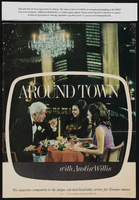Search the Special Collections and Archives Portal
Search Results
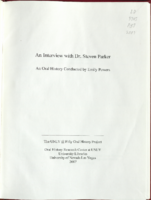
Transcript of interview with Dr. Steven Parker by Emily Powers, December 19, 2006
Date
Archival Collection
Description
Text
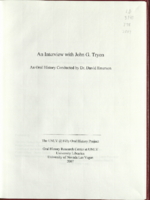
Transcript of interview with John G. Tryon by Dr. David Emerson, February 21, 2006
Date
Archival Collection
Description
Text
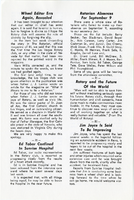
The Wheel Las Vegas Rotary Club newsletter, 1960s-1970s
Date
Archival Collection
Description
Text
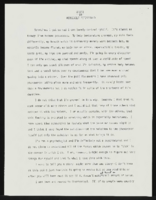
"Anger": article draft by Roosevelt Fitzgerald
Date
Archival Collection
Description
From the Roosevelt Fitzgerald Professional Papers (MS-01082) -- Drafts for the Las Vegas Sentinel Voice file. On Pat Buchannan, Crossfire and Rodney King.
Text
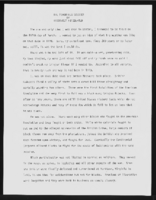
"The Forgotten Soldier": article draft by Roosevelt Fitzgerald
Date
Archival Collection
Description
From the Roosevelt Fitzgerald Professional Papers (MS-01082) -- Drafts for the Las Vegas Sentinel Voice file. On Black military service.
Text

Photographs of Virtue Vice and Venue signs, Las Vegas (Nev.), June 28, 2017
Date
Archival Collection
Description
Site address: 750 Fremont St
Sign owner: Victor Perrillo
Sign details: This building was constructed in 2015 for the Venue which is a concert venue and special event center that usually holds weddings and proms. The Arizona based owners have a similar venue to this one in Scottsdale, Arizona.
Sign condition: 5- Very new and still works good
Sign form: Sign on Building
Sign-specific description: The roof line that they building has is a curved Moorish style, right below the roof line is a channeled "V" that contains incandescent light bulbs. Below this is black channeled block letters spelling out "THE VENUE" which illuminate a whitish gold color.
Sign - type of display: Neon and Incandescent light bulbs
Sign - media: Steel
Sign - non-neon treatments: Incandescent light bulbs
Sign animation: Flasher for incandescent light bulbs
Sign environment: This location is in the East District of Fremont, on the same side of the street as the El Cortez but about half a block to the East. This location is across the street from the Container Park and also has one of the "Fremont Street East District" signs in the street in front of this property.
Sign - date of installation: 2015
Sign - thematic influences: Sine they are a venue for many different events this name is perfect for the location and their sign is well representative of that.
Sign - artistic significance: The channeled "V" and words "The Venue" help contain the light.
Survey - research locations: Las Vegas Weekly article https://lasvegasweekly.com/as-we-see-it/2015/jun/03/the-venue-downtown-concert-hall-fremont-east/ , The Venue website http://thevenuesgroup.com/, acessor's page
Survey - research notes: The building was constructed for this specific company in 2015 , and previous to this it was an empty lot for a few years.
Surveyor: Emily Fellmer
Survey - date completed: 2017-09-01
Sign keywords: Neon; Incandescent; Steel; Flashing; Building-front design; Fascia
Mixed Content
UNLV December 6, 2023 Memorial Collection
Identifier
Abstract
The UNLV December 6, 2023 Memorial Collection (2023-2024) contains material documenting the response to the deadly shooting on UNLV's Maryland Parkway campus on December 6, 2023. The collection contains items left at spontaneous memorials, such as handwritten notecards, small religious tokens, bracelets, teddy bears, and artificial flowers. Also included in the collection are videos of the UNLV vigil service held on December 13, 2023, archived UNLV websites, and condolence items sent to campus administration. Additionally, two members of the UNLV community donated their personal photographs and journal entries relating to the day of the shooting.
Archival Collection
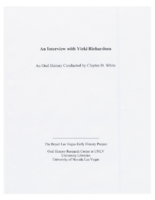
Transcript of interview with Vicki Richardson by Claytee D. White, August 19, 2003
Date
Archival Collection
Description
Interview with Vicki Richardson conducted by Claytee D. White on August 19, 2003. As a high school junior in Wilmington, Delaware, Richardson was one of twelve African American students chosen to integrate the school system. A civil rights activist in high school and college, Richardson wrote letters to local newspapers and engaged in protests to desegregate public spaces. Inspired by Harlem Renaissance painters, Richardson paid her way through college by teaching art at a recreation center. She went on to Vanderbilt University and later the University of Chicago where she had a Ford Foundation Fellowship to study inner-city education. She taught at Forestville High School in Chicago where she was Chairwoman of the Art Department and later at Rancho High School in Las Vegas. Richardson owns Left of Center Art Gallery in North Las Vegas and several other local businesses.
Text

